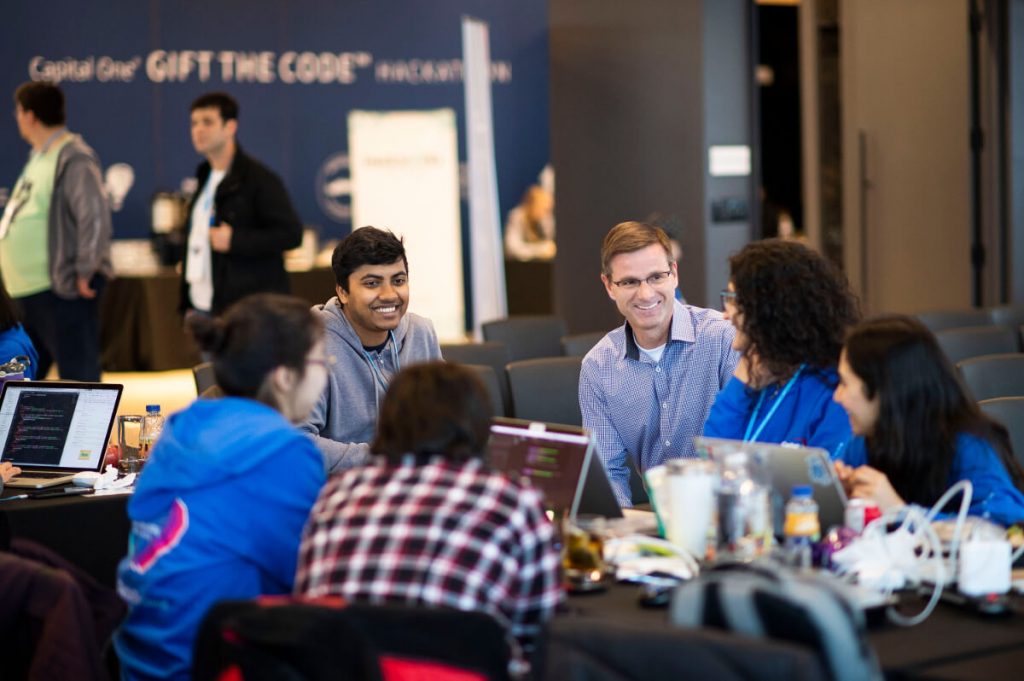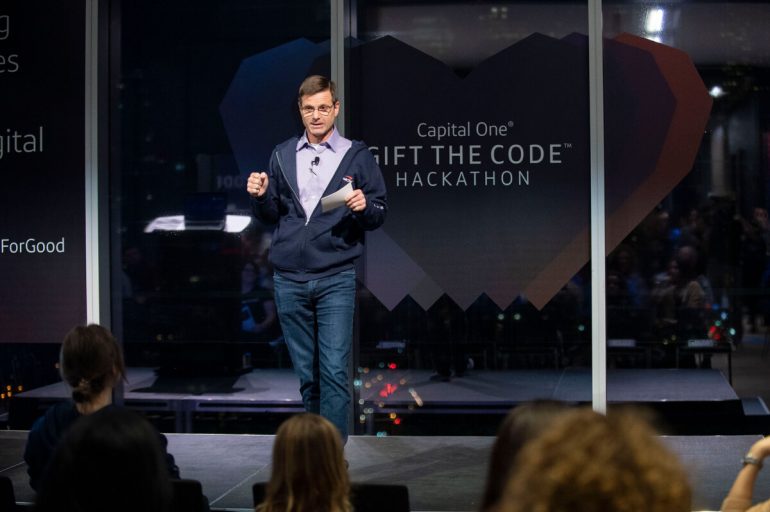As a technology publication, BetaKit attends a lot of hackathons. Some big, some small, but all sharing a few commonalities: tired eyes, lots of junk food, and a prevailing sense of accomplishment, even if the positive outcomes from a weekend of coding are unclear.
Recently, Capital One hosted its third annual Gift the Code hackathon. With over 200 participants representing 34 different teams, the event featured two key differences from the majority of hackathons taking place across the country.
To start, the event was for charity, with each team hacking solutions for one of six different charities: Kids Help Phone, the Movember Foundation, Camp Quality, the Boys & Girls Clubs of Canada, the Centre for Mindfulness Studies, and Toronto Cat Rescue.
“Money is great – charities can definitely leverage money – but this hackathon is about people giving their time and skills.”
Perhaps more importantly, each team of developers, designers, and hackathon enthusiasts were singularly focused on what they were trying to achieve, with the winning teams producing startling results over a 48-hour period. Junk food and tired eyes aside, their sense of accomplishment was underwritten by technology solutions the six charities could actually use.
Speaking with Capital One Canada CTO Mark Cauwels, he indicated that Gift the Code is a result of clear focus and a commitment to doing the hard work before the weekend begins.
“Our purpose is to bring in technologists and partner them with the charities to close a specific technology gap,” Cauwels said. “We recognize many charities aren’t able to leverage technology as much as they possibly could to help deliver their services.”
Having recognized that the charities and non-profits participating in Gift the Code don’t really have “the resources, the time, or the expertise” to develop and discover technology solutions that might aid them, Cauwels indicated that a lot of the important work for the hackathon comes weeks before, where Capital One “charity champions” embed with the organizations to articulate clear problem statements. Turning those problem statements, whether they’re “more of a data problem or a website problem,” into clear challenges for the hacking teams means they can hit the ground running when the hackathon begins.
“Even though the charities know what their challenges are, it’s just a little bit of fine-tuning so that we have clear problem statements that our hackathon teams can grasp onto,” he said.

Cauwels also reinforced the importance of ensuring the work doesn’t end when the weekend is over. The CTO noted that Gift the Code participants open source their solutions, so they can not only be improved upon in the future, but also be leveraged by other charities. Capital One also meets regularly with the organizations post-event, and has committed $100,000 in funding to ensure that the solutions developed during Gift the Code have the follow-on support and resources to be implemented.
“It’s not about just one weekend. It’s about making sure we’re continuing to build on top of what the teams are putting their time towards,” Cauwels said, underscoring that Capital One’s efforts are more about participation than a donation. “Money is great – charities can definitely leverage money – but this hackathon is about people giving their time and skills.”
The follow-through is encouraging at a time when “tech for good” can come across as a buzzword. There’s also the open global question as to whether or not our tech-focused society is causing more harm than good. For his part, Cauwels believes Capital One has a lot to offer.
“Capital One has been undergoing a digital transformation journey for quite a while,” he said. “We have a lot of expertise in our organization from undergoing our own industry transformation.”
“But Capital One is just the spark,” he continued. “Our focus is bringing people from the local tech community together to better understand and reduce the technology gap for charities. It’s not just about our engineers participating – we in the technology industry should all be helping charities close that gap as much as possible.”
“The time committed from technologists and volunteers from around the Toronto area has been outstanding. We’d love for this to continue to grow in the years to come because that means we can support even more charities.”
BetaKit is a Gift the Code media partner and this article is sponsored by Capital One.

